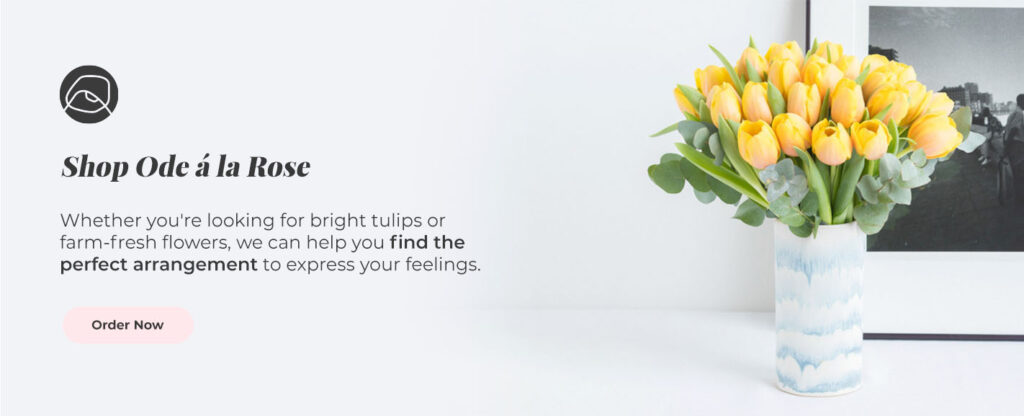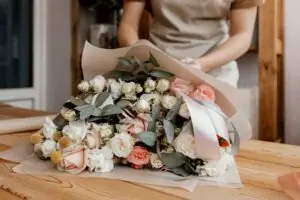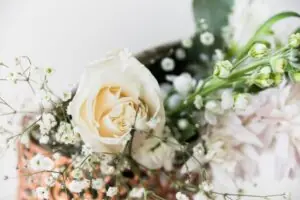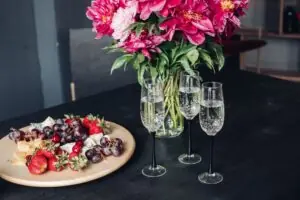In business settings, gestures matter. But are flowers considered the right gesture in a professional environment?
The answer is yes, when done thoughtfully. Flowers can be a powerful way to acknowledge a promotion, express sympathy, celebrate a company milestone, or thank a client. However, business flower-giving comes with its own set of unspoken rules. What works in a personal context might feel inappropriate or confusing in a corporate one.
That’s where flower etiquette comes in. Understanding what’s appropriate, when to send flowers, and how to tailor your choices for different business occasions can strengthen relationships and reflect well on you and your company. In this guide, we’ll walk through the key dos and don’ts of giving flowers in professional settings, so your gesture always strikes the right tone.
- General Guidelines for Giving Flowers
- Presentation Matters
- Occasion-Specific Flower Etiquette
- Cultural Considerations in Flower Giving
- Flower Color Meanings
- Modern Flower Etiquette Tips
- When to Avoid Gifting Flowers
- Shop Ode a La Rose
General Guidelines for Giving Flowers
A well-timed floral gesture can enhance a professional relationship, but it has to be handled with care. In business, flowers should never feel too personal, too flashy, or out of place. The goal is to be thoughtful without crossing boundaries. W
When in doubt, less is more. A simple, well-chosen arrangement makes a far better impression than something large and attention-grabbing.
Choosing Appropriate Flowers
When selecting flowers for a professional setting, the meaning behind your choice matters. Some flowers carry strong emotional or cultural connotations that can be misinterpreted if not chosen carefully.
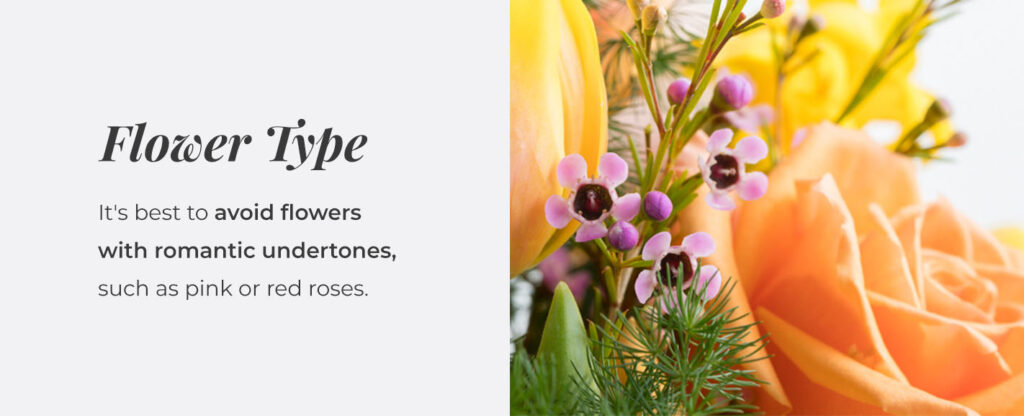
- Understand symbolism: For instance, red roses often signal romance, definitely not the right message in most business contexts. Instead, opt for flowers that symbolize respect, appreciation, or success. Orchids suggest elegance and refinement. White lilies can be suitable for sympathy. Tulips or irises are excellent for congratulations. Always be mindful of how the flowers might be received across different cultures as well.
- Consider the relationship: The formality of the arrangement should match the nature of your connection. A team member retiring after 30 years deserves a bouquet different from a vendor who delivered on time. The closer or longer the relationship is, the more personalized you can be, but always keep it professional.
- Know their preferences: If you’re aware of the recipient’s favorite color or flower, incorporating it shows thoughtfulness without being overly personal. It’s a subtle way to make the gesture feel more intentional.
- Beware of allergies: In shared offices, the wrong flowers can become a disruption. Heavily scented blooms or those with excess pollen, like lilies, daisies, or sunflowers, may cause discomfort. Play it safe with hypoallergenic options like orchids, hydrangeas, or succulents.
Presentation Matters
How you present flowers in a business context can elevate or undermine the gesture. Every detail should reflect professionalism and awareness of the environment.
- Keep wrapping simple: Skip the glittery cellophane and dramatic ribbons. Instead, go for crisp paper wrapping in neutral tones or an understated presentation box, like the unique Ode à la Rose package box that comes for free with every order. Clean, modern design cues are best, your packaging should look like it belongs in an office, not at a wedding.
- Include a personal note: A few well-chosen words go a long way. Whether you’re congratulating someone or offering support, a handwritten (or neatly printed) note clarifies the intent and adds warmth without going overboard. Keep it concise, respectful, and relevant to the occasion.
- Skip the alcohol: Champagne might be a traditional gift in some circles, but alcohol in the workplace can raise eyebrows, or worse, create complications. A high-quality non-alcoholic sparkling drink is a smart alternative. It feels celebratory while keeping things inclusive and appropriate.
- Stick to modest sizes: Oversized bouquets can be distracting and hard to manage in office settings. Choose arrangements that are small to medium in size, elegant enough to stand out, but compact enough to fit on a desk or reception table without creating clutter.
- Add a vase: Including a tasteful vase turns your gift into something ready to enjoy and helps avoid the awkward scramble for a container. It also leaves behind a lasting, practical item that can continue to serve as a subtle office accent.
Occasion-Specific Flower Etiquette
The right flowers can say a lot, but only when they match the moment. Different occasions call for different choices, and knowing how to navigate each one makes your gesture feel thoughtful rather than awkward. Here’s how to get it right across a range of common situations.
1. First Dates
Bringing flowers on a first date can be sweet if you keep it low-key. Skip the dozen red roses and go for something light and casual, like a single tulip or a small bunch of wildflowers. It’s not about making a big impression; it’s about showing you put in a little thought without going overboard. Simple, fresh, and easy is the way to go.
2. Anniversaries
For romantic anniversaries, feel free to be personal. Go with their favorite flowers or something symbolic, like roses, peonies, or an elegant mix. But in a work setting, like a colleague’s job anniversary, tone it down. A tasteful, neutral arrangement (think orchids or clean seasonal stems) feels appropriate without being too personal. Either way, a short, meaningful note goes a long way.
3. Sympathy and Funerals
This is where sensitivity really matters. Stick with traditional, soft colors, white lilies, warm pastels, chrysanthemums, or muted roses, which are safe choices. Bright colors, like yellow and orange, can feel out of place unless you know the family’s preferences. And when you’re sending something on behalf of a company or team, a calm, respectful tone is key. Following proper flower etiquette here helps ensure your message offers comfort, not confusion.
4. Weddings
Giving flowers to a couple on their wedding day? Best to skip it—chances are, they’ve already got more flowers than they know what to do with. If you want to send something, do it ahead of time or wait until after the honeymoon. Keep it simple, classy, and separate from the event itself. A small arrangement with a kind note is always appreciated, or, if you want to be remembered, send a preserved rose bouquet, because it will outlast most of the other guests’ floral arrangements.
5. Theater and Performances
It’s still a lovely gesture to bring flowers for performers after a show. Dancers, actors, musicians, they all appreciate a small, manageable bouquet to celebrate a great performance. Stick with something they can easily carry, like a neat bunch of tulips or a dozen roses wrapped in paper. Bonus points if you include a note, just a few encouraging words can make it feel personal.
6. Corporate Gifting
This is where flower etiquette really matters. In professional settings, the goal is to be thoughtful but never too personal. Avoid anything too fragrant, flashy, or romantic. Instead, think structured arrangements: orchids, succulents, or sleek seasonal flowers. A clean presentation and a short, polite note are all you need. And if you’re including a gift, make it something neutral, like a non-alcoholic sparkling drink or a branded notebook.
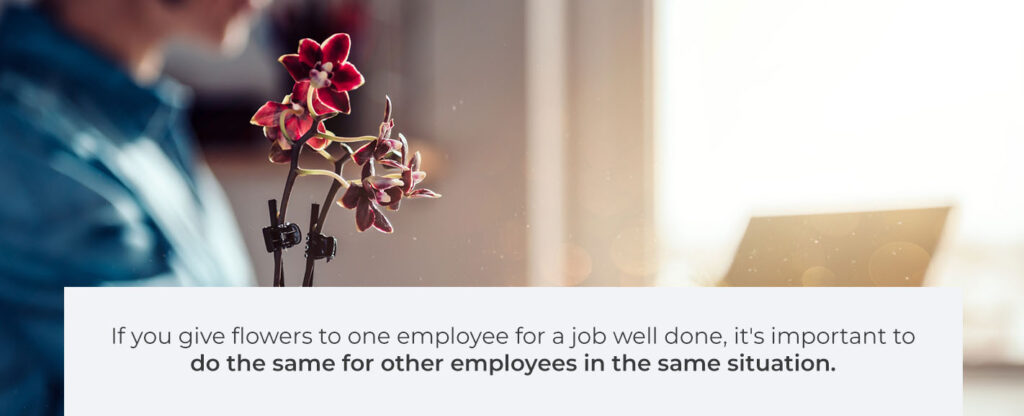
7. Birthdays
For friends or partners, go ahead and make it personal, favorite flowers, fun colors, maybe even something a little quirky. But in a workplace? Keep it bright but simple. Gerberas, tulips, or mixed seasonal flowers are great go-to choices for birthdays. Something that sits nicely on a desk, looks cheerful, and doesn’t overwhelm the space. A friendly message makes it feel warm without being too much.
8. Get-Well-Soon
When someone’s under the weather, get-well-soon flowers can really lift their mood, but only if they’re chosen with care. Skip anything overly fragrant or messy. Go for soft, gentle flowers like carnations or sunflowers, something cheerful but easy on the senses. If they’re in a hospital, always check the rules first. And if it’s a coworker, sending flowers to their home feels more thoughtful than delivering to the office..
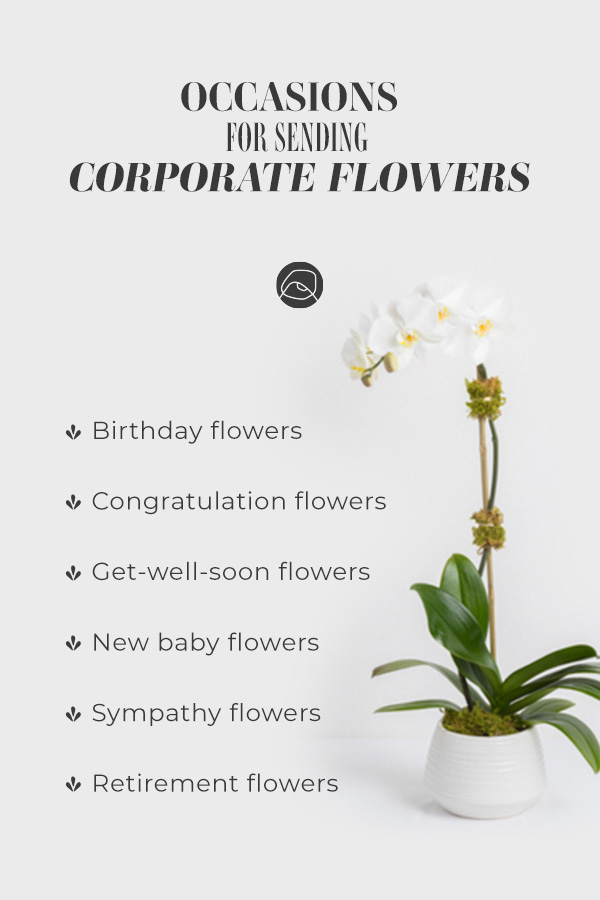
Cultural Considerations in Flower Giving
Giving flowers can be a kind gesture, but depending on where you are, it can also carry unintended meaning. Flower etiquette isn’t one-size-fits-all. Different countries, and even different regions, have their own customs around when and how to give flowers.
In some cultures, certain flowers are reserved strictly for mourning. For example, chrysanthemums are seen as funeral flowers in many European and East Asian countries, while in the U.S., they’re often used in cheerful fall arrangements. Red roses, while romantic in most Western cultures, might be considered inappropriate in formal or business contexts elsewhere.
Numbers also matter. In some countries, like China or Japan, even numbers are avoided for sympathy arrangements, especially the number four, which is associated with death. Odd numbers (excluding 13) are generally safer. A dozen roses might be considered romantic in the U.S. or Europe, but in some cultures, it’s the number 11 or 9 that signifies lasting affection.
Giving 100 roses can come across as extravagant or even excessive unless the occasion clearly calls for it, such as a milestone anniversary. Fifty roses might suggest abundance and generosity, while 75 roses could signal a deep level of commitment—but again, context is everything.
When gifting internationally or to someone from a different cultural background, it’s worth doing a bit of research or even asking someone discreetly. A thoughtful gesture should never accidentally cause discomfort.
Flower Color Meanings
Color says just as much as the flower itself. Whether you’re picking out a bouquet for a colleague, client, or loved one, understanding what different hues traditionally represent can help you send the right message and avoid sending the wrong one.
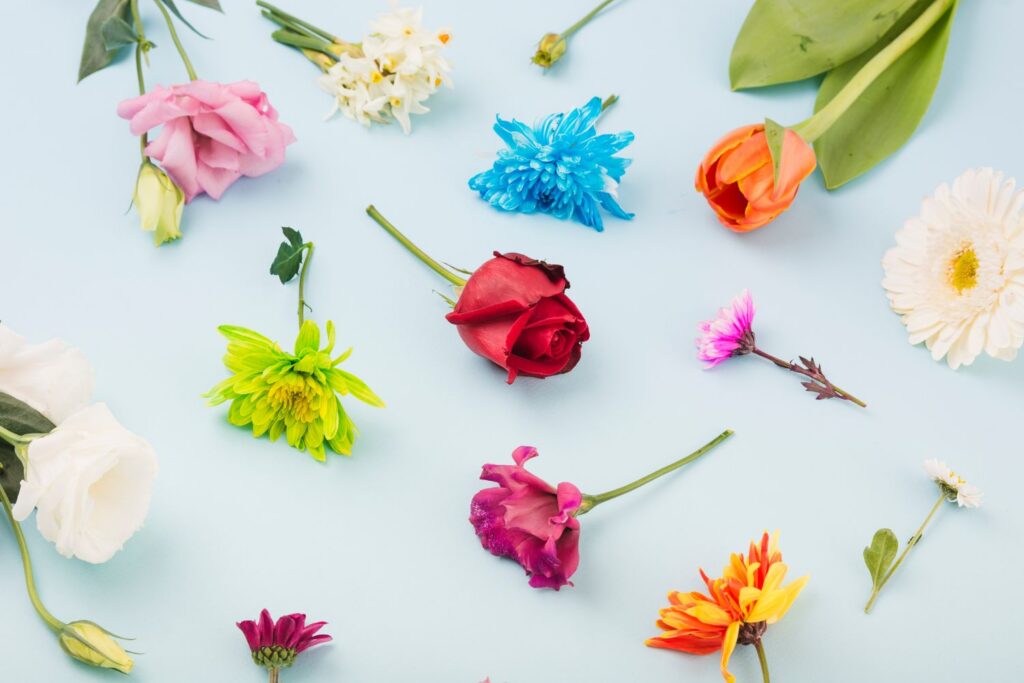
- Pink: Often associated with admiration, grace, and gratitude. Pink flowers are great for birthdays, thank-you gestures, or workplace appreciation—warm without being too intense.
- White: A classic symbol of purity, peace, and respect. White flowers are commonly used in sympathy arrangements and formal occasions, but they also work well in elegant corporate settings.
- Orange: Bold and energetic, orange flowers are great for celebrations and congratulations. They convey enthusiasm and confidence but can feel too intense in somber or very formal settings.
- Red: Universally linked with love and passion, red flowers, especially roses, are best kept for personal relationships. In business or neutral settings, they can feel too emotionally charged.
- Purple: A color tied to dignity, success, and admiration. Purple flowers are an excellent choice for promotions, professional milestones, or congratulating someone with style.
Modern Flower Etiquette Tips
While some traditions hold strong, flower etiquette has evolved, especially in modern business and urban settings. Here are a few updated tips to keep your floral gestures appropriate and well-received today:
- Digital-first doesn’t mean thoughtless: Online flower delivery is the norm now. Just make sure your message is personalized and the timing makes sense. Last-minute flowers can feel rushed, so plan ahead when possible.
- Sustainability matters: Many people appreciate eco-conscious gestures. Opt for local, in-season flowers when you can, and skip plastic-heavy packaging. Reusable vases and minimal wrapping go a long way.
- Neutral > personal in the workplace: In a business setting, keep things tasteful. If you’re unsure about preferences or boundaries, opt for neutral flowers and messages. The goal is to be kind, not overly familiar.
- Ask when it makes sense: It’s okay to ask about preferences or allergies for recurring gestures, like annual client gifts. It shows thoughtfulness, not a lack of spontaneity.
When to Avoid Gifting Flowers
As kind and thoughtful as flowers can be, there are times when they’re better left out. Here’s when to skip the bouquet:
Flowers are a kind gesture, but not always the right one. In some situations, they can feel out of place, misunderstood, or even inappropriate. Here are the moments when it’s best to hold back:
- During workplace conflicts or sensitive HR matters: Sending flowers after a disagreement, disciplinary meeting, or any HR-related issue can create tension or be misinterpreted as insincere, or worse, manipulative. In these moments, clear communication and professionalism matter more than gestures.
- Following a romantic rejection or breakup: What may seem like a peace offering to the sender can feel uncomfortable or pressuring to the recipient. Respect boundaries and give people space when emotions are running high.
- To someone with allergies or sensitivities: Even well-meaning gifts can cause discomfort in shared environments. If you’re unsure about allergies or scent sensitivities, it’s better to avoid fresh flowers and opt for a more neutral, practical gesture instead.
- In highly formal or conservative cultures without context: Some cultures associate certain flowers or colors with funerals, misfortune, or inappropriate messages. If you’re unsure of the recipient’s cultural background, especially in international or diplomatic settings, it’s smart to do a little research, or choose a different kind of gift entirely.
- When the gesture might feel performative: Gifting flowers during public recognition (like giving a large bouquet at a company meeting or event) can feel more like a performance than a genuine gesture, especially if the recipient is introverted or prefers privacy. When in doubt, keep it low-key.
- If the timing is awkward: Late deliveries (like flowers arriving days after an event), overly extravagant arrangements at casual gatherings, or surprise gifts during busy work hours can all feel more disruptive than thoughtful.
- To avoid sending mixed signals: In professional environments, avoid flower types or colors that carry romantic undertones, especially when gifting across genders or hierarchies. Even a well-intentioned bouquet can cause discomfort or confusion if the message isn’t crystal clear.
The best gifts are the ones that feel natural, timely, and considerate. Sometimes, holding off is the most respectful choice you can make.
Shop Ode á la Rose
If you’re looking for flowers that strike the perfect balance between elegance and professionalism, Ode à la Rose makes it simple. We specialize in modern, Parisian-inspired arrangements that are just as suitable for the office as they are for personal occasions.
Every bouquet is crafted with premium blooms and wrapped in a signature style – refined, understated, and always on message. Whether you’re congratulating a colleague, thanking a client, or marking a special milestone, Ode à la Rose helps you express it with taste.
Plus, with same-day delivery in select cities and thoughtful add-ons like handwritten notes and non-alcoholic pairings, it’s easy to stay on top of your flower etiquette, without the guesswork.
